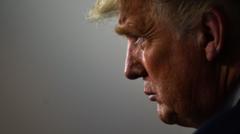With an ambitious agenda and a loyal team, Trump plans to rapidly implement far-reaching reforms, raising questions about his potential impact on American democracy.
Trump's Ambitious Second Act: Aiming for Transformative Change

Trump's Ambitious Second Act: Aiming for Transformative Change
As Donald Trump prepares for his second inauguration in a cold Washington DC, he aims to redefine America's political landscape with immediate executive actions.
In a moment marked by unprecedented cold, Donald Trump will be inaugurated once again as the President of the United States, ready to embark on a transformative journey for the nation. The ceremony, which takes place indoors at the US Capitol for the first time in 60 years, symbolizes a new chapter as he begins his tenure defined by action as much as promises. At a rally preceding his inauguration, Trump hinted at a whirlwind of executive orders set to be signed immediately, addressing contentious issues such as immigration, environmental regulations, and transgender rights.
While Trump enters this new phase with a strong mandate from voters, winning both the popular and electoral votes, there are pervasive uncertainties around the approach he will take. Critics voice alarm over his potential disregard for democratic norms, fearing he might operate with dictatorial tendencies. Former President Joe Biden warned about the formation of a powerful oligarchy surrounding Trump that could endanger fundamental American freedoms.
Having secured a solid electoral victory, Trump is focused on enacting his agenda with a more competent configuration of his administration this time. He is expected to swiftly dismiss many federal employees while viewing a “deep state” within the government as an obstacle to his agenda. The expectation is that these moves will lead to a highly politicized federal apparatus.
However, several of Trump's proposed initiatives, particularly tax cuts favoring corporations and the wealthy, will require congressional approval. Fortunately for him, the Republican Party holds majority control in both the House and Senate, reducing the likelihood of serious dissent.
As Trump aims to consolidate his power, logistical challenges loom large over initiatives such as mass deportations of undocumented immigrants or legal actions against his political adversaries. The Democratic Party, still recovering from their electoral defeats, may struggle to launch effective resistance.
Meanwhile, major tech moguls such as Elon Musk and Jeff Bezos, who are expected to attend the inauguration, have started to align themselves with Trump, indicating a potential cooperative dynamic in the corporate realm.
On inauguration day, Trump is anticipated to showcase striking executive decisions, perhaps pardoning individuals convicted during the Capitol riots, a move likely to galvanize his base. Yet, the practical fallout from some of his policies, including tariffs expected to elevate consumer prices and labor shortages due to deportations, may complicate matters for ordinary Americans, an audience he aims to keep captivated.
Trump's second term may indeed be marked by both spectacle and substantial governance shifts, with potential consequences reverberating far beyond U.S. borders. As he steps into the role of president again, the stakes are high, and the world watches closely as he seeks to etch his transformative ambitions into American history.





















